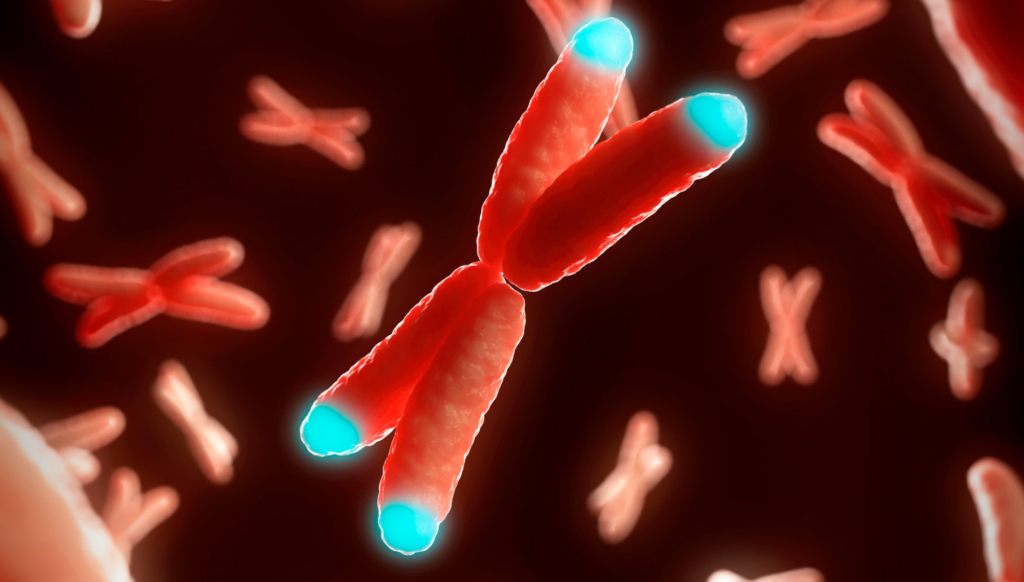What’s This Research About?
This narrative review analyzes a series of studies about the effects of yoga, mindfulness, and meditation on telomere length (TL). They discuss the connections between mindfulness meditation, yoga, and the specific ways telomeres and telomerase work. In the end, they hope to provide a better grasp of how these activities affect our cells and could have important implications for future research and treatments.
Telomere length (TL) is an indicator of age-related health and well-being. TL shortens over time during cell division. Other factors such as diet, exercise, sleep, and stress also impact TL. Previous research shows that mindfulness practices may positively impact TL but specific protocols have not been established yet.
Telomeres and Telomerase
Chromosomes contain our DNA and proteins. Imagine telomeres as protective caps at the ends of chromosomes, like the tips on shoelaces. These telomeres help keep our genetic information stable. As cells divide, these protective caps can get shorter, a natural part of aging. When they become too short, the cells can no longer divide properly, which is associated with aging and age-related diseases. So, telomeres play a role in protecting our genetic material and are often used as a marker of cellular aging. But an enzyme called telomerase works like a repair tool, keeping the caps in good shape. So, telomerase helps counteract the natural shortening of these protective caps. Telomeres play important roles in our cells, affecting things like aging, how cells behave as they get older, the health of organs, and even the development of cancer.
Yoga, Mindfulness and Telomeres
People are paying more attention to mindfulness, meditation, and yoga because they might have a positive effect on how our cells age and how long we live. Recent studies are looking into how these activities are connected to the way telomeres and telomerase work. The findings suggest there might be interesting links between these practices and how our cells age.
Previous Research
Some yoga and MBSR (Mindfulness-Based Stress Reduction) practices seem to be associated with higher telomerase activity and longer telomeres in those who practice them, indicating a potential role in maintaining cell health and longevity. While early studies suggest this, more in-depth scientific investigations are needed to fully understand how yoga and mindfulness practices influence telomeres.
For example, one study showed that people who do yoga regularly have longer telomeres, which might mean their cells could stay healthier for a longer time. Another study found that individuals practicing yoga and meditation had increased activity of telomerase. Yet another study suggested that mindfulness meditation might protect cells from aging by reducing the wearing down of telomeres. Overall, several studies have shown that yoga and meditation practices are associated with better cell health, as seen in longer telomeres and increased telomerase activity.
The results vary because they differ in how they were done, how long they lasted, and the people involved. While some studies suggest that doing yoga is connected to better cell health, we need more carefully planned and long-term studies to confirm this. Using randomized controlled trials are the best way to examine this idea. They can help minimize factors that might affect the results and make sure the groups being studied are comparable.

TITLE: A Narrative Review of Telomere Length Modulation Through Diverse Yoga and Meditation Styles: Current Insights and Prospective Avenues
PUBLICATION: Cureus
DATE: September 2023
AUTHORS: Vahe Aghajanyan, Supriya Bhupathy, Shazia Sheikh, Fauzia Nausheen
Telomere: Telomeres are repetitive DNA sequences at the ends of chromosomes. They protect the ends of chromosomes from becoming frayed or tangled. Each time a cell divides, the telomeres become slightly shorter. Eventually, they become so short that the cell can no longer divide successfully, and the cell dies. Telomeres get shorter as we age.
Telomere erosion: The gradual shortening of telomeres that occurs with aging
Telomere length (TL): a recognized marker of healthy aging and susceptibility to age-related diseases

